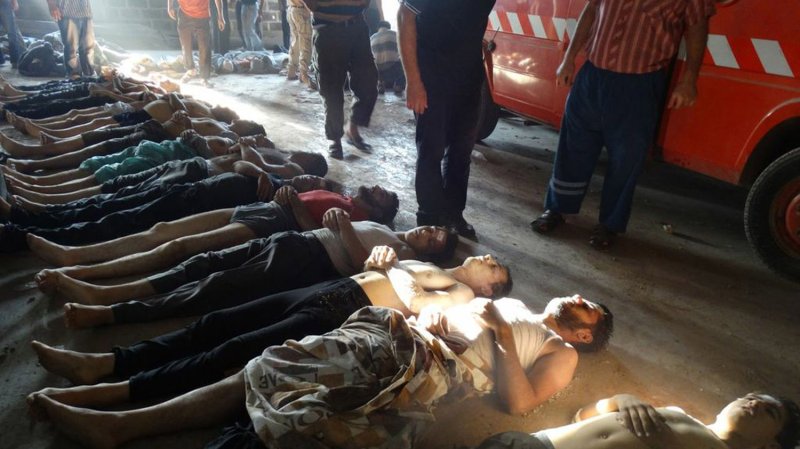1 of 6 | Men walk past bodies placed in a temporary morgue as Syrian rebels claim they were killed in a toxic gas attack by pro-government forces in eastern Ghouta, on the outskirts of Damascus in Syria on August 21, 2013. Syrian rebels claim they were killed in a toxic gas attack by pro-government forces and the Syrian government has denied the claims. The UN is investigating. UPI/Mohammed Al-Abdullah |
License Photo
WASHINGTON, Aug. 27 (UPI) -- A U.S. response to the Syrian regime's use of chemical weapons is coming but may not result in Bashar Assad's ouster, President Obama's spokesman said Tuesday.
Obama has not yet decided what form the U.S. reaction will take, White House press secretary Jay Carney told reporters at the daily briefing in Washington, but, "There must be a response."
Carney said the president's options "are many and they include a variety of possibilities that are not limited to the use of force." He said the administration still does not intend to put U.S. forces on the ground in Syria.
"The president continues to work with his national security team, reviewing the options available to him," Carney said. "And when he has made a decision and has an announcement to make, he'll make it. So that process continues."
Carney said the U.S. intelligence community was still working on assessing the situation. He said once the assessment is complete, "we would provide information to the public about it in the coming days," probably this week.
Vice President Joe Biden said at the American Legion national convention in Houston Tuesday there is "no doubt" the Syrian government was responsible for the chemical attack, CBS News reported
"We know that the Syrian regime are the only ones who have the weapons, have used chemical weapons multiple times in the past, have the means of delivering those weapons, have been determined to wipe out exactly the places that were attacked by chemical weapons," Biden said.
Carney said both he and Secretary of State John Kerry attempted to make clear Monday "there is no doubt here that chemical weapons were used on a massive scale on Aug. 21 outside of Damascus."
"There is also very little doubt -- and should be no doubt for anyone who approaches this logically -- that the Syrian regime is responsible for the use of chemical weapons on Aug. 21 outside of Damascus," Carney said.
"So the deliberations that are taking place now and the options that are being considered by the president and his national security team are not around the question of whether or not chemical weapons were used in Syria on a significant scale, causing mass death and injury to innocent civilians, to women and children. It is not around the question of whether or not the Syrian regime is responsible. It's around the question of, what is the appropriate response to this clear violation of international norms."
Carney said the administration is consulting with congressional leaders and has consulted with the leaders of Canada, France, Britain and Australia.
Carney reiterated the administration's stance that "there is no military solution" to the civil war in Syria and that one must be reached through "negotiation and political resolution."
But, he said, the use of chemical weapons by the Syrian regime "cannot be ignored."
"It must be responded to because to allow it to happen without a response would be to invite further use of chemical weapons and to have that -- that international standard dissolve," Carney said.
"And the consequences of that, given the volatility of the region and the concerns that this nation and many others have about proliferation of chemical weapons, would be very serious indeed.
"But this -- this deliberation and the actions that we are contemplating are not about regime change."
Reaction to the volatile situation varied. U.S. Sen. John McCain, R-Ariz., said any strikes against Syria must have "lasting impact," NBC News reported.
The Hill reported former anti-war Democratic congressman Dennis Kucinich, now a political analyst, said a strike against Syria would turn the United States into "al-Qaida's air force."
At the U.S. State Department, deputy spokeswoman Marie Harf pointed out the Arab League had issued "a very strong statement" during the morning.
"It sharply condemned the use of banned chemical weapons. That's something, of course, that we agree with," Harf said. "It called for holding the Syrian regime fully responsible for this crime. And I think it would be important to say at the top that we believe that any careful review of the facts in this situation leads to the conclusion that the regime was, in fact, behind this horrific chemical weapons attack, that it's undeniable that chemical weapons were used here on a large scale.
"We know that the regime maintains custody of those weapons and uses these types of rockets. And we also know that the opposition does not have those capabilities."
Harf said the president, Kerry and others "remain in close consultation with our international partners and allies," but declined to say whether any U.S. response would first require action by the United Nations Security Council.















